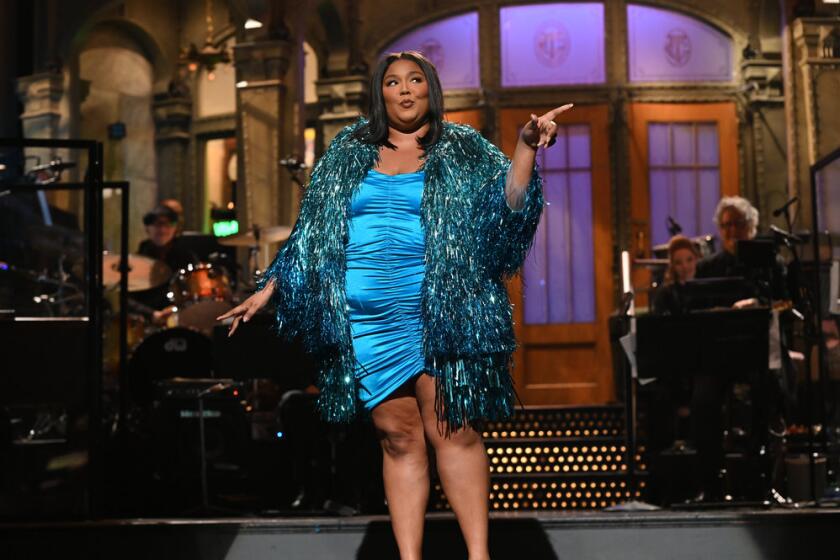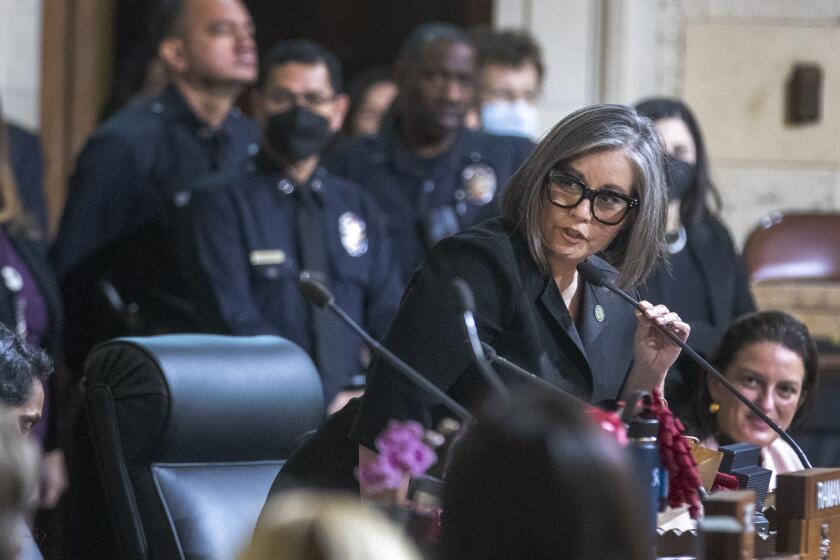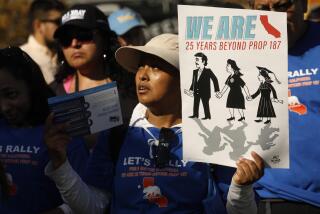Column: Americans are terrified of other Americans. How to stop the polarization

A few months ago, I knocked on the front door of a house in El Centro while searching for Republicans to interview for a story. An elderly white man opened the main door of the house but left the screen door closed. I struggled to see him through the screen door’s mesh. I told him I was a journalist hoping to learn about his political views, and that I couldn’t see him very well. “That’s the point,” he told me.
He seemed angry. He said President Biden was a “dumbass,” adding: “We need to hunt down all the illegals and get them the hell out of this country!” I asked: “Hunt them down?” He said: “Hunt them down!” As I struggled to understand his perspective by asking more questions, he became more and more condescending: “Don’t you read? Don’t you understand history?” As I was responding that I’d been reporting on the border since Obama was president, he interrupted: “Obama was a dumbass n—.”
I ended the interview. What was the point of continuing a conversation with a man so unabashed in his bigotry? This man, I thought, was a threat to me and people I love. He clearly felt the same about me. We weren’t alone in our grim judgments. Most Americans today see other Americans as threats. A plurality believe other Americans are the No. 1 threat to their way of life, according to a CBS News/YouGov poll released last summer. In the fall, an NBC News poll found that 80% of Democrats and Republicans believe political opposition “poses a threat that, if not stopped, will destroy America as we know it.”
Opinion Columnist
Jean Guerrero
Jean Guerrero is the author, most recently, of “Hatemonger: Stephen Miller, Donald Trump and the White Nationalist Agenda.”
It has become an article of faith in left-wing and right-wing activist circles that a crucial way to counter the threat is by naming it. Republicans are no longer Republicans and Democrats are no longer Democrats. Instead, we’re all called fascists.
But what if the threats we represent are rooted in this way we demonize one another? What if our perception of adversaries as mortal enemies is a delusion that creates its own reality and becomes a self-fulfilling prophecy?
The two sides are not equally situated. Studies show Republicans have moved farther to the right than Democrats have to the left, and right-wing extremists are the most likely to embrace violence. The GOP is engaged in an assault on the bodily autonomy of women, people of color and transgender people. There is no comparable assault on people’s rights from Democrats, although many Republicans would disagree.
But how can I hope to persuade Republicans to change their minds if I’m convinced they’re all extremists? Where I see fascists and neo-Nazis, I see no possibility for dialogue. Accurate as those labels may be, they also limit my ability to see an opponent’s potential for change. As Mónica Guzmán wrote in her book, “I Never Thought Of It That Way,” a guide for talking with our opponents, polarization is “the problem that eats other problems, the monster who convinces us that the monsters are us.”
There’s only so much progress society can make by punishing people. We get better results by teaching one another and doing better together.
Earlier that day in El Centro, I interviewed Republicans who expressed ideas I believed to be delusional and dangerous, but I was able to sustain conversations with them. Unlike the angry old man, they talked with me eye-to-eye. They didn’t use slurs or other labels.
One man who said he believes immigrants at the border are “replacing” Americans also expressed empathy for “those poor souls coming across the river.” Not exactly the words I expected from a man who subscribes to a white supremacist conspiracy theory.
Since that man very likely votes for the same politicians as the angry old man, he’s arguably as much of a threat in putting right-wing authoritarians in office. But if I don’t allow for the possibility of finding common ground with him, I’m surrendering all hope that this country can survive the chasm that separates us.
Of course, there is a place for strong condemnation. It’s why I went against my aversion to labeling people and titled my biography of Trump advisor Stephen Miller “Hatemonger.” The media too often whitewashes the actions and rhetoric of people in power. We have a responsibility to criticize our leaders.
But I’m not so sure that labeling ordinary people who support those leaders does any good. While it’s true that the power of demagogues comes from the masses of ordinary people who support them, it’s also true that the devotion of those masses stems from a moral outrage aggravated by the moral outrage of the other side.
Monica Rodriguez, Eunisses Hernandez and Hugo Soto-Martinez are all trying to ensure that the scandal doesn’t harm vulnerable Angelenos any further.
When we use derogatory labels, we’re disregarding the lessons of nonviolent communication that are well-known among psychologists and mediators who study peaceful conflict resolution. “Most of us grew up speaking a language that encourages us to label, compare, demand, and pronounce judgments rather than to be aware of what we are feeling and needing,” wrote psychologist and peacemaker Marshall B. Rosenberg in his acclaimed 1999 book, “Nonviolent Communication.”
In the era of social media, it has become even more trendy to troll and shame. But most of us who are in therapy have learned that moralistic judgments — in the form of labels, insults, diagnoses, blame and more — fuel defensiveness and doubling down from others. That communication style also stokes violence, according to Rosenberg.
It’s not fair that anybody has to engage with people less inclined to see them as equals, but what choice do we have? The only other options are national divorce or civil war.
For a relationship to survive, it’s best to communicate “what we are observing, feeling, and needing,” Rosenberg wrote, rather than naming the other’s wrongness. Communicating with an open heart inspires others to do the same. It’s human nature to mirror other people. We all need more faith in our ability to connect with the other. Risky as that may sound, it can’t be riskier than giving up on the humanity of our fellow Americans.
More to Read
A cure for the common opinion
Get thought-provoking perspectives with our weekly newsletter.
You may occasionally receive promotional content from the Los Angeles Times.














